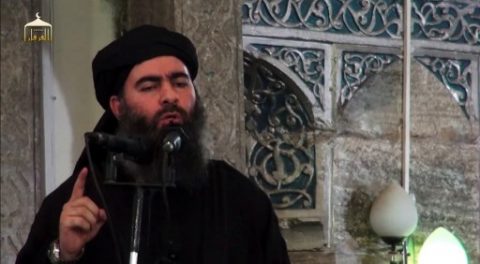
The Russian army on June 16, 2017 said it had struck a meeting of Islamic State leaders in Syria on May 28 and was trying to verify whether the group’s leader had been killed, news agencies said on Friday. In a statement, the army said the attack took place near the IS stronghold of Raqa “which was also attended by IS leader Abu Bakr al-Baghdadi,” the media reported, adding that the military was trying verify “by various means” whether he had been killed. / AFP PHOTO /
WASHINGTON, United States (AFP) — Pentagon chief Jim Mattis said Friday he cannot confirm whether or not Islamic State chief Abu Bakr al-Baghdadi is dead, after reports from Syria that the jihadist leader had been killed.
“If we knew, we would tell you — right now, I can’t confirm or deny it,” Mattis said.
“Our approach is we assume he’s alive until it’s proven otherwise, and right now I can’t prove it otherwise.”
The Britain-based Syrian Observatory for Human Rights, a longtime conflict monitor, said earlier this week it had heard from senior IS leaders in Syria’s Deir Ezzor province that Baghdadi was dead.
There was no official confirmation or denial of the news on IS-run social media outlets.
“We’ll go after him until he’s gone,” Mattis said.
There have been persistent rumors that Baghdadi has died in recent months.
Russia’s army said in mid-June that it was seeking to verify whether it had killed the IS chief in a May air strike in Syria.
With a $25 million US bounty on his head, Baghdadi has kept a low profile but was rumored to move regularly throughout IS-held territory in Iraq and Syria.
The 46-year-old Iraqi has not been seen since making his only known public appearance as “caliph” in 2014 at the Grand Mosque of Al-Nuri in Mosul, which was destroyed in the battle for Iraq’s second city.
© Agence France-Presse







